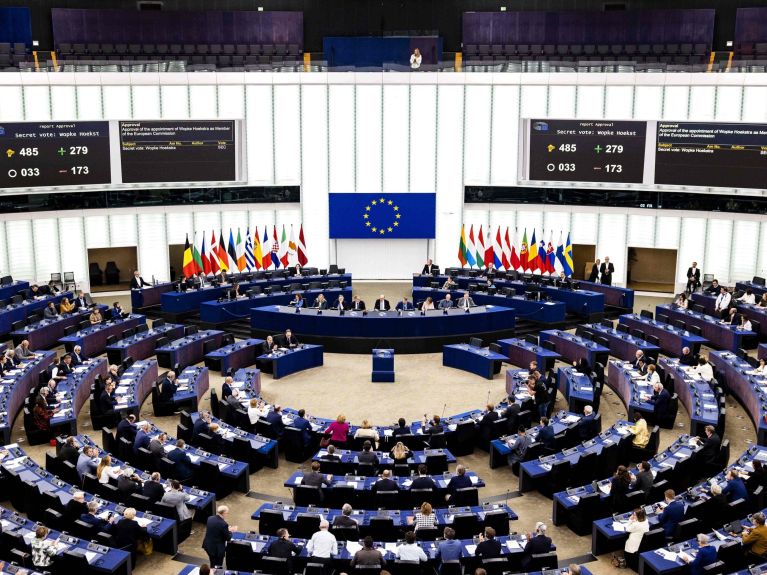“Strengthen positive forces within Europe.”
The political scientist Daniela Schwarzer talks about the importance of the European elections, challenges facing the EU, and the need for reforms.

The future of the European Union has long been a key issue for the political scientist Daniela Schwarzer. She was previously Director of the German Council on Foreign Relations and sits on the board of the Bertelsmann Foundation. She also serves on the working group on EU reforms set up by the German and French governments. In an interview she talked about the European elections, challenges facing the EU and the strengths of the union.
Professor Schwarzer, what is the significance of European elections when compared to national elections in Germany and other EU countries?
When over 400 Europeans go to the polls in June to elect their new parliament, they are setting the course which the EU will take over the next five years. They will elect their new representatives, who vote on the members of the European Commission and other leading EU roles. The European Parliament also plays a vital role in passing legislation, the EU budget and in international agreements. In many areas its powers are equal to those of governments on the Council of Ministers.
That’s why it’s important to cast your vote on 9 June. In the last European elections in 2019 it was great to see participation across Europe at 50.6%. That was the highest level since 1994, chiefly because young people got to vote, and for many of them the climate was a source of deep concern. What matters now is mobilising them once more in 2024, as in many EU states – including Germany – 16-year-olds will be able to vote for the first time.
Do you think the elections are seen as a way of setting the course for Europe in the way you describe?
Keeping the focus on major shared challenges of the future remains difficult when campaigns continue to be focused on and conducted at a national level. Even though this is the tenth European election, there is no one common voting day and the voting age varies between 16 and 21. Voters also cast their votes for national candidates on national lists of national parties. There are no European parties. The 2024 European elections could again become a way of gauging voters’ views of national governments, like a kind of early Bundestag election in Germany. That said, given the huge political issues and risks, now would be the right time for a common political narrative and a pan-European election campaign.

What are the main challenges facing the EU now and in the next legislative period of the European Parliament?
Europe needs to assert itself in a world which is changing more and more quickly and conflict is becoming more widespread. Our continent has been rocked by the war in Ukraine since February 2022, and China is trying employ unfair competition to make itself the leading global power reshape the global order according to its standards - which do not match European values. The outcome of the elections in the USA this November will have a profound impact on our relations with the US, and the strong role it plays in European security may change.
Europe must therefore do more for its own security, competitiveness, internal cohesion and ability to act outside its own borders. In short, Europe must promote prosperity, democracy and peace in our continent to bring about a green and democracy transformation which upholds social and democratic values. That is a huge task and no member state – even one as big as Germany – could manage it alone.
The EU is a unique amalgamation of successful democracies and a huge market.
Yet the most important task of all remains to strengthen the positive forces within Europe and develop a positive vision for the future. The EU is a unique amalgamation of successful democracies and a huge market, why is why more countries and citizens in particular want to join. The EU has many entrepreneurs, outstanding researchers and scientists, and a very active civil society. These must all be part of how we respond to the challenges which are dampening the optimism which people (and the younger generation in particular) feel about the future. This means the EU needs to become more flexible and creative in places. It must also fight back against attempts in some member states to undermine democratic culture.
Yet the most important task of all remains to strengthen the positive forces within Europe and develop a positive vision for the future.
What might future expansions of the EU mean?
Russia’s invasion of Ukraine has brought up the question of European political geography again. Twenty years on since the EU’s eastward expansion, some see an urgent need for more states to join the EU to stabilise the EU’s neighbourhood and counteract the growing dominance of China and Russia in the continent. The EU will need to prepare itself internally for this during the next legislative period, as expansion only makes sense if it strengthens the union. This cannot succeed if the EU does not set new priorities, review the funding for the necessary policies, and reform institutions and decision-making mechanisms, some of which are at their limits already.

